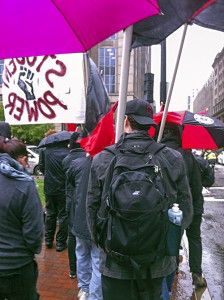
Wind and rain did not stop about 80 protesters from marching against capitalism on Tuesday, shouting, “One, two, three, four! Let’s call a class war!” as part of the annual worldwide May Day celebration.
The march began at Copley Square and ended at City Hall Plaza with a rally sponsored by the Boston May Day Committee, the International Socialist Organization and other groups.
Occupy Boston called for the 99 percent to “strike, skip work, walk out of school and refrain from shopping, banking and business for a day without the 99 percent,” according to its website.
About 25 Boston University students and faculty participated in the march.
Graduate School of Arts and Sciences alumna Molly Geidel said when they were marching, cab drivers and people stood on the side of the road while honking their horns with fists in the air.
“It shows that even though it’s raining and the Occupy movement has started to wane a little, there’s still this real desire to fight for workers’ rights and the rights of people in debt and the unemployed,” Geidel said.
Geidel said one of the protesters at the march, third-year GRS student Ian Chinich, has been responsible for re-energizing BU.
Chinich said the rally was commemorating martyrs who died for the eight-hour workday in 1886.
“We’re here to show solidarity and . . . have an anti-capitalist message, especially now that the system seems to be proving that capitalism and exploitation of the rich against the poor is increasing inequality and making millions of unemployed people,” he said.
The day included a block party in the financial district earlier in the morning and a funeral procession for the death of capitalism in the evening.
College of Arts and Sciences freshman Julien Jacquelin said May Day demonstrations happen annually and globally, so the fact that the Occupy movement is joining just helps boost its numbers.
“I’m an anarchist, so this whole event lines very much with my ideals,” Jacquelin said. “I don’t believe in capitalism at all.”
Patricia Stuelke, a BU professor of American studies, said she and about seven of her students attended the morning protest.
“[We] came down to protest this morning for our final day of class to see the Occupy movement in action since we studied it in class,” she said, “and to just participate in protests against [the] neoliberal culture that we’ve been studying.”
Stuelke said it was nice to see movement culture emerging again in the United States and to talk to different people about it.
“We want to be in solidarity with . . . the vast majority of people whose jobs and livelihoods are not secure,” Geidel said.
Labor unions and other organizations showed their support of immigrant, worker and human rights.
Joey Hiller, of Dorchester, is a member of the Industrial Workers of the World, a union that aims to fight for laborers’ rights.
“This is the kind of the thing we can’t not participate in because a lot of the prominent figures in the union fought for Americans to have the eight-hour workday,” Hiller said.
Protesters said the Haymarket affair in Chicago inspired their protests.
“Particularly as someone who self-identifies as an anarchist, the five people who died as part of the Haymarket martyrs in the 1886 were all anarchists,” Chinich said, “and most of them hadn’t even attended the demonstration when things got out of hand and a bunch of police were killed.”
Even though jobs and technology have changed, the situation of workers around the world is just as bad as it was a long time ago, Hiller said, and people are still dealing with the same issues.
“We’re still here for them, and we’ll all be here for each other,” Hiller said, “and this is just a really good day for all working-class people to come together . . . [for] a joint commiseration and finding some kind of new strength and solidarity through that act.”


















































































































pictures, awesome, fun pics, sexy girls, mindfuck, epic, weird, insane, crazy, neat, confusing, babes, images, internet, emo, scene girls, social, selection, dirty, hot, photo, Fotografie, úžasné, zábavné foto, sexy dívky, Mindfuck, epické, podivn • Feb 5, 2013 at 10:06 pm
Thanks for another great article. Where else may anybody get that kind of info in such a perfect method of writing? I’ve a presentation next week, and I’m on the look for such info.
Billy • May 5, 2012 at 10:51 am
Patricia Stuelke – Socialist.
Her Rate My Professor comments says it all.
Because Socialism has brought so much wealth to so many people in … wait … in … I’ll think of the country in a sec.